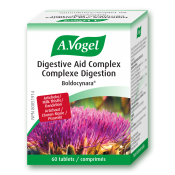What’s indigestion?
Indigestion is a term commonly used to describe a digestive disorder that causes a feeling of pressure in the abdominal region, a stomach-ache, heartburn or the sensation of feeling full after only a few bites. The disorder is often accompanied by a lack of appetite, a bad taste in your mouth, bloating and gas. This collection of gastric symptoms is also known as dyspepsia.
You’ve probably experienced indigestion at some point—most of us have. Episodes are typically temporary and are usually considered normal. Here are a few examples of normal indigestion:
- feeling full, bloated and uncomfortable after scarfing down a big piece of cake
- burping repeatedly after a copious or fatty meal
However, there are times when indigestion symptoms become a regular, daily experience, even after eating normal amounts at mealtime. At this point, you’ve got an indigestion problem.
An estimated 40% of us have experienced digestive problems at some point in our lives.
The digestive tract at work
Digestion comprises all the activities of the digestive tract: preparing foods for absorption by the body and eliminating what the body can’t use. Regardless of which foods you eat, their waste products should ideally be eliminated within 24 hours.
The digestive tract has to manage all kinds of foods, so it’s not surprising that it often gets overloaded. Sometimes you ask too much of it, especially when you don’t take the time to chew your food properly, making your stomach work harder.
Your food choices can also stress your digestive system, which often leads to indigestion and the associated burps and gas. These symptoms often become difficult to manage, especially when you’re at work or a social gathering.
What you can do to prevent or at least relieve indigestion problems
First, take a close look at your food and lifestyle.
Do you…
- Eat too fast?
- Chew with your mouth open or drink while eating?
- Eat big meals?
- Find that you’re stressed out or worried, or have heated discussions at the table?
- Eat irritating foods that can slow digestion, like alcohol, vinegar, caffeine and fatty or spicy foods, or eat processed foods such as white flour and white sugar?
See if you can make a few adjustments to your diet and monitor how they improve things. If your symptoms become minor, you may just have found the answer you were looking for.
If changing your diet or how you eat doesn’t make all your symptoms go away, you have two more options:
Plant-based remedies – A group of well-known bitter medicinal herbs have been used for decades to relieve digestive problems. They include artichoke, dandelion and boldo.
Conventional medications – These include antacids, H2 inhibitors and proton-pump inhibitors (PPI), available through your doctor or pharmacist.
When to see a doctor
Most people who suffer from indigestion will be able to manage their symptoms without having to see a physician, especially if the symptoms are infrequent and minor. However, in some cases, it’s best to err on the side of caution and consult your doctor. These include when:
- You suspect that you might have an underlying medical condition, such as a stomach ulcer
- You feel intense pain
- You have blood in your stools
- You’ve experienced unexplained weight loss
- You vomit and see traces of blood
- You’re 55 or over and have never had indigestion until now
- You find that the medication you’re taking only makes your symptoms worse





